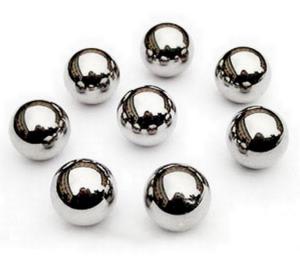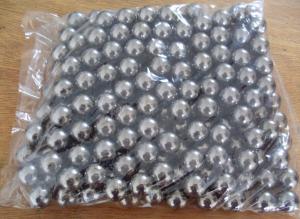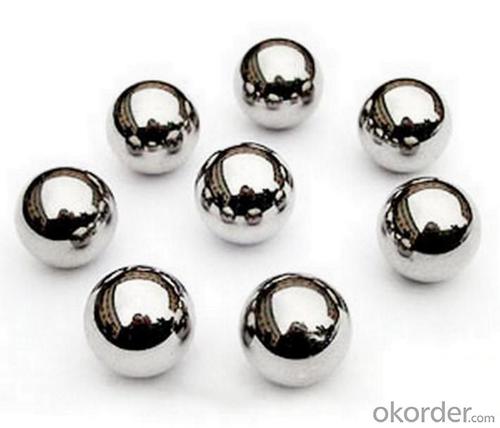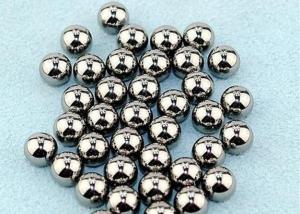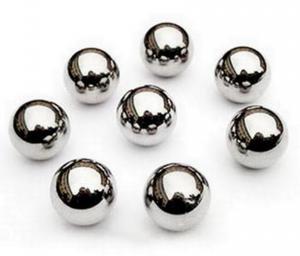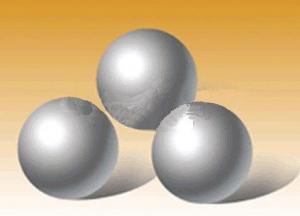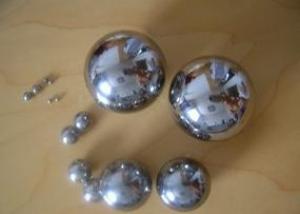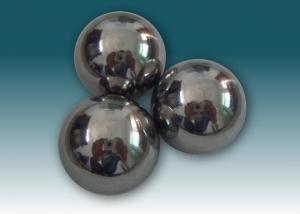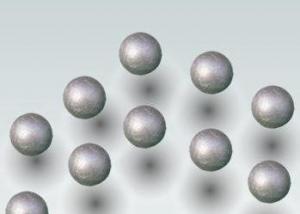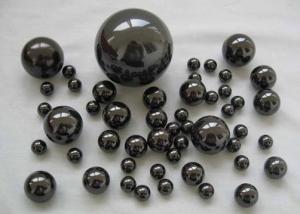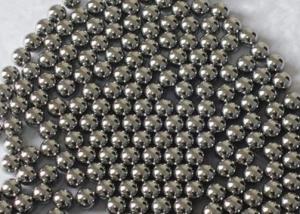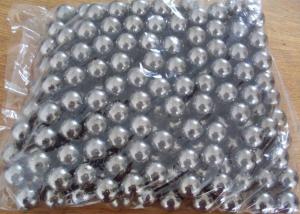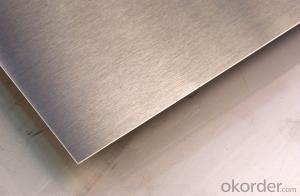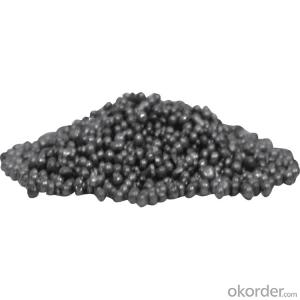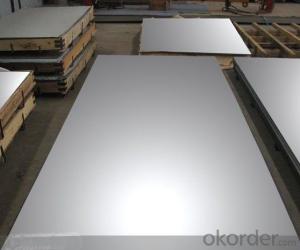Stainless Steel Balls-UNION,AISI 420 430 440 SS304 316
- Loading Port:
- Shanghai Port or Others
- Payment Terms:
- TT or LC
- Min Order Qty:
- 5 Tons pc
- Supply Capability:
- 500 Tons Per Month pc/month
OKorder Service Pledge
OKorder Financial Service
You Might Also Like
|
Item |
Stainless Steel Ball |
|
Category |
Stainless Steel Ball |
|
Material |
AISI 420 430 440 SS304 316 |
|
Size |
0.5mm--25.4mm, 1/4",3/16",5/32",1/8",7/32",5/16",7/8",1" |
|
Grade |
G100-G3000 |
|
Hardness ( HRC) |
HRC58-65 |
|
Application |
Bicycle, Bearing, Pulley, Slide, Handcraft, Shelf, Luggage, Hardware, Grinding media |
|
Standard |
GB/T-308-2002, GB/T1148-93 |
|
Matched Standard |
DIN, JIS, ASME |
|
Certification |
ISO |
|
Packing |
Oily packing in pouch packing,plastic/tin box packing 1, 25kg/carton with steel pallet packing 2,25kg/carton without steel pallet packing 3,10kg/box then in wooden case packing 4,250kg/ steel drum packing or according to customers' requirement |
|
Place of original |
China |
|
Delivery |
Within 30 days or confirmed while placing order |
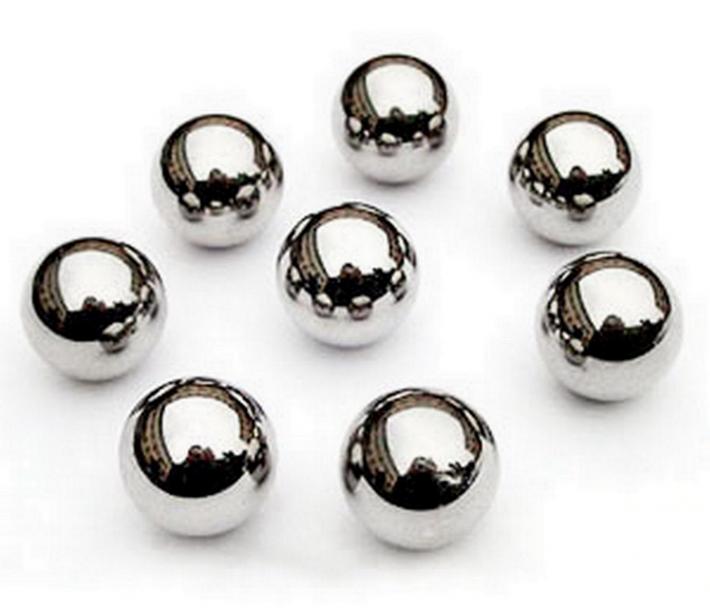
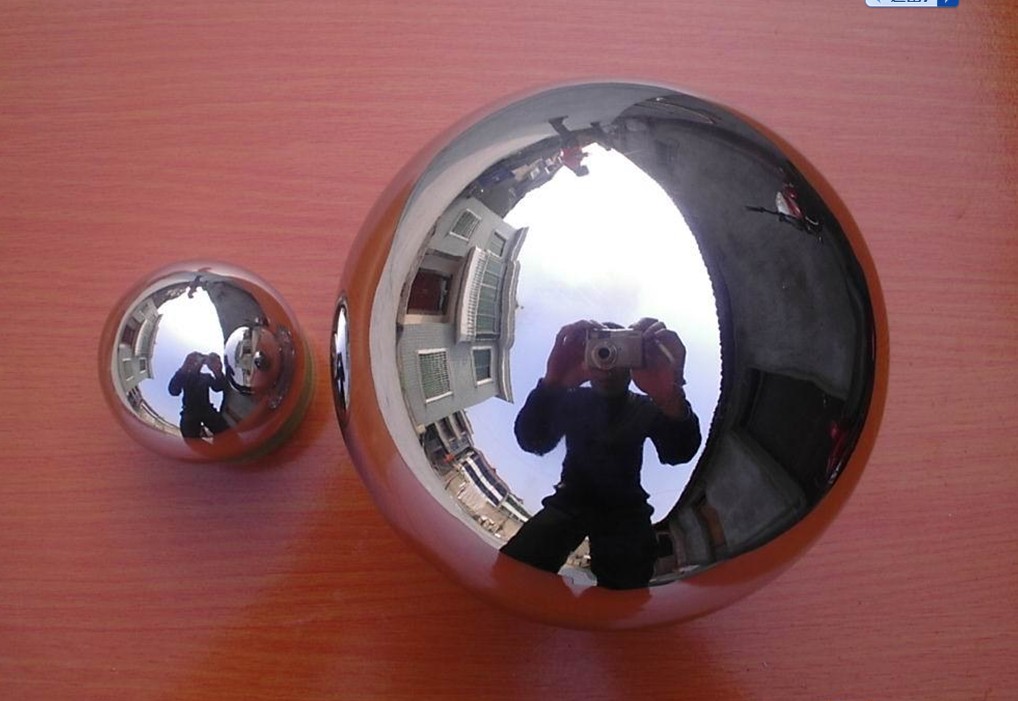
- Q: Are stainless steel balls suitable for use in firearms or ammunition?
- Depending on the specific application, stainless steel balls can indeed be suitable for use in firearms or ammunition. The reason for this is that stainless steel possesses corrosion resistance, high strength, and durability, making it an excellent choice of material for various components of firearms. In particular, stainless steel balls are commonly utilized as projectiles in ammunition, particularly in air guns or certain types of non-lethal ammunition. They are also applicable in firearm mechanisms like trigger assemblies or ball bearings, where their resistance to corrosion and wear is advantageous. Nevertheless, it is crucial to acknowledge that the appropriateness of stainless steel balls for firearms or ammunition hinges on the particular requirements and specifications of the specific firearm or ammunition being employed. To ensure optimal performance and safety, it is always advisable to consult firearm manufacturers or experts regarding the appropriate materials to be used.
- Q: What are stainless steel balls used for?
- Various industries utilize stainless steel balls for a multitude of purposes. One prevalent application is in ball bearings, where they serve to minimize friction and enable smooth motion between two components. These bearings can be found in a wide array of machinery and equipment, including automobiles, industrial machines, and household appliances. The aerospace industry also relies on stainless steel balls, particularly in aerospace bearings and valves. Due to their ability to withstand extreme temperatures and harsh environments, as well as their resistance to corrosion and high strength, stainless steel balls are well-suited for aerospace applications. Furthermore, the food and beverage industry benefits from the use of stainless steel balls. In food processing equipment such as mixers and blenders, these balls aid in the efficient mixing and blending of ingredients. The use of stainless steel ensures that the balls do not contaminate the food products. Moreover, the medical field utilizes stainless steel balls, especially in surgical instruments and devices. They are employed for precision measurement, calibration, and as components in medical equipment. Stainless steel balls are also utilized in ball plungers and check valves to provide a dependable seal and regulate the flow of liquids and gases. Overall, stainless steel balls are versatile components that have various applications across different industries. Their primary functions include reducing friction, facilitating movement, providing a seal, and ensuring precision in measurement and control.
- Q: Are stainless steel balls more durable than other materials?
- Yes, stainless steel balls are generally more durable than other materials due to their high strength, corrosion resistance, and ability to withstand extreme temperatures.
- Q: How do you polish stainless steel balls?
- Achieving a polished surface on stainless steel balls requires specific materials and a methodical approach. Here is a step-by-step guide to help you accomplish this: 1. Collect the necessary materials: Mild soap or detergent, warm water, a soft cloth or sponge, a stainless steel cleaner or polish, and a microfiber cloth are essential tools for this task. 2. Initiate the cleaning process: Combine warm water with mild soap or detergent in a bowl. Immerse the soft cloth or sponge in the soapy water and meticulously cleanse the stainless steel balls. Ensure the removal of any dirt, dust, or grime from the surface. Thoroughly rinse the balls with clean water and pat them dry using a clean towel. 3. Apply the stainless steel cleaner or polish: Once the balls are clean and dry, employ a small quantity of stainless steel cleaner or polish onto a microfiber cloth. It is crucial to adhere to the instructions provided by the cleaner or polish product for optimal outcomes. 4. Execute the polishing procedure: Employing the microfiber cloth, gently rub the stainless steel balls in a circular motion. Apply gentle pressure to eliminate any lingering stains or tarnish. Continue the polishing process until the desired level of shine is attained. 5. Buff the balls: After polishing, utilize a clean microfiber cloth to buff the stainless steel balls. This action will eliminate any excess cleaner or polish residue and provide a final gleam to the balls. 6. Assess and repeat if necessary: Upon completion of the polishing procedure, evaluate the stainless steel balls to determine if they meet your expectations. If certain areas require further improvement, repeat the process by applying additional cleaner or polish and continue polishing until the desired outcome is achieved. Always remember to adhere to the manufacturer's instructions when utilizing any cleaning or polishing products. With proper care and maintenance, your stainless steel balls will retain their shine for an extended period.
- Q: Can stainless steel balls be used in chemical storage applications?
- Yes, stainless steel balls can be used in chemical storage applications. Stainless steel is highly resistant to corrosion and oxidation, making it suitable for storing various chemicals. The chemical stability and strength of stainless steel prevent it from reacting with most chemicals and ensure the integrity of the storage system. Additionally, stainless steel balls are durable and have a long service life, making them an ideal choice for chemical storage applications. However, it is important to consider the specific chemical being stored and consult with a specialist to ensure the compatibility of stainless steel with the chemical in question.
- Q: Can stainless steel balls be used in fluid power systems?
- Yes, stainless steel balls can be used in fluid power systems. Stainless steel is known for its corrosion resistance and durability, making it suitable for various applications, including fluid power systems. These systems often involve the transmission of hydraulic or pneumatic power, where stainless steel balls can be used as check valves, ball valves, or in other components. The stainless steel material ensures that the balls can withstand the pressure, temperature, and corrosive nature of the fluid being transported. Additionally, stainless steel balls provide excellent sealing properties, reducing the risk of leakage and ensuring the efficiency and reliability of the fluid power system.
- Q: Are stainless steel balls resistant to magnetization?
- Yes, stainless steel balls are generally resistant to magnetization. Stainless steel is a non-magnetic material, meaning it does not have the ability to be magnetized or attracted to magnets. This resistance to magnetization is due to the composition of stainless steel, which includes a high percentage of chromium. The presence of chromium creates a protective layer on the surface of the steel, preventing the material from being magnetized. However, it's important to note that stainless steel can become weakly magnetic if it is subjected to certain manufacturing processes or if it contains other magnetic elements in its composition.
- Q: Can stainless steel balls be used in food processing or medical applications?
- Stainless steel balls are commonly used in food processing and medical applications due to their many beneficial properties. Stainless steel is known for its corrosion resistance, making it suitable for use in environments where cleanliness and hygiene are crucial. In food processing, stainless steel balls are often used in equipment such as mixers, blenders, and mills, where they come into contact with food ingredients. Similarly, in medical applications, stainless steel balls are used in devices like surgical instruments, dental tools, and prosthetics. Stainless steel balls are preferred in these industries because they are easy to clean and maintain. They have a smooth surface that resists buildup of contaminants, making them highly suitable for applications requiring strict sanitation standards. Furthermore, stainless steel is non-reactive, meaning it does not leach harmful chemicals or alter the taste of food or medicines. The high strength and durability of stainless steel balls are also advantageous in these applications. They can withstand rigorous processing conditions, such as high temperatures, pressure, and mechanical stress, without compromising their integrity. This ensures their long-lasting performance and minimizes the risk of contamination or product failure. To summarize, stainless steel balls are indeed suitable for use in food processing and medical applications. Their corrosion resistance, cleanliness, non-reactivity, and durability make them a reliable choice for ensuring the safety and quality of food and medical products.
- Q: Can stainless steel balls be used in automotive suspensions?
- Yes, stainless steel balls can be used in automotive suspensions. Automotive suspensions are responsible for supporting the weight of the vehicle, absorbing shocks, and maintaining stability and control. Stainless steel balls are known for their high strength, corrosion resistance, and durability, making them suitable for use in such demanding applications. These balls can be used in various suspension components, including ball joints, tie rod ends, and control arms. Stainless steel balls offer several advantages over other materials commonly used in automotive suspensions. Their corrosion resistance ensures longevity and reduces the risk of premature failure due to rust or wear. The high strength of stainless steel allows the balls to withstand heavy loads and impacts without deformation or breakage. Furthermore, stainless steel balls have excellent hardness and wear resistance, which helps to minimize friction and improve the overall performance and lifespan of the suspension system. Additionally, stainless steel balls are often used in racing and high-performance vehicles due to their ability to handle extreme conditions and provide precise control and responsiveness. These balls can withstand high temperatures, vibrations, and intense forces, making them an ideal choice for automotive suspensions that undergo rigorous use. However, it is important to note that the use of stainless steel balls in automotive suspensions may vary depending on the specific design and requirements of the suspension system. Factors such as load capacity, vehicle weight, and intended use should be considered when determining the suitability of stainless steel balls for a particular suspension application. In conclusion, stainless steel balls can indeed be used in automotive suspensions due to their strength, durability, corrosion resistance, and superior performance characteristics. Their use can contribute to a more reliable, long-lasting, and efficient suspension system in vehicles.
- Q: Can stainless steel balls be used in pneumatic control valves?
- Yes, stainless steel balls can be used in pneumatic control valves. Stainless steel is a common material used in valve components due to its high strength, corrosion resistance, and durability. Pneumatic control valves often require reliable and long-lasting components, and stainless steel balls can provide these qualities. Stainless steel balls can withstand high pressure and temperature conditions, making them suitable for various applications in pneumatic control valves. Additionally, stainless steel balls are compatible with a wide range of fluids and gases, further enhancing their suitability for use in pneumatic control valves.
1. Manufacturer Overview
| Location | Wuxi,China |
| Year Established | 2003 |
| Annual Output Value | Above US$8.3 Million |
| Main Markets | SouthEast Asia |
| Company Certifications | ISO9001:2000 |
2. Manufacturer Certificates
| a) Certification Name | |
| Range | |
| Reference | |
| Validity Period |
3. Manufacturer Capability
| a) Trade Capacity | |
| Nearest Port | Shanghai |
| Export Percentage | 30% |
| No.of Employees in Trade Department | 30 People |
| Language Spoken: | English;Chinese |
| b) Factory Information | |
| Factory Size: | Above21,000 square meters |
| No. of Production Lines | Above 7 |
| Contract Manufacturing | OEM Service Offered;Design Service Offered |
| Product Price Range | Average |
Send your message to us
Stainless Steel Balls-UNION,AISI 420 430 440 SS304 316
- Loading Port:
- Shanghai Port or Others
- Payment Terms:
- TT or LC
- Min Order Qty:
- 5 Tons pc
- Supply Capability:
- 500 Tons Per Month pc/month
OKorder Service Pledge
OKorder Financial Service
Similar products
Hot products
Hot Searches
Related keywords
